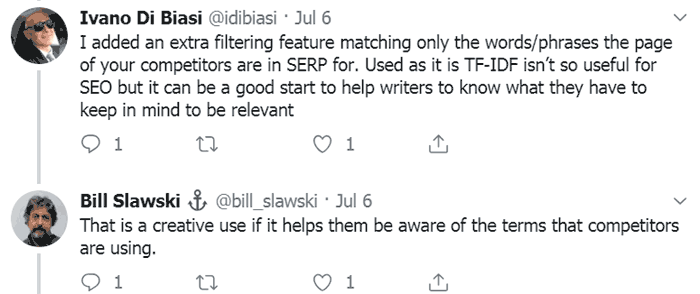Does a writer really need a software to tell them how to write in order to rank better in Google? Content analysis software and services provide information about your content that can help you make better decisions about the content as well as identify potential problems.
Software calls attention to patterns. But some programs aggregate the top 10 or 20 SERP positions, which results in inaccurate conclusions.
The reason is because the search intent can vary throughout the top ten search results. Different search intents means that a phrase may require different answers. So the keywords for the top two or three positions may be different from the next few positions.
Aggregating content analysis between sites that are addressing different search intents may result in less useful information.
SERP content analysis software used in local search SERPs can yield useful insights. That makes sense since many of theses lightly competitive spaces tend to have a more homogeneous search results, where the words associated with the search intent are fairly uniform.
Correlations and Patterns
Patterns discovered in the SERPs, like all other statistical patterns that can be discovered in the SERPs, don’t necessarily correlate to actionable data.
A pattern of title tag use in the SERPs for a particular keyword phrase does not mean that the pattern contributed to the rankings.
Patterns exist everywhere. So it’s good to not ascribe too much meaning to them. The reason why sites rank in the SERPs are due to multiple ranking factors.
Useful Content that Ranks
Content is said to be the most important ranking factor. Yet links play a powerful role as well. Images, user experience, speed of the site, all of these factors work together.
In my opinion, content analysis software is useful. They can alert you to poor word use. They can also identify poor grammar or overly complicated sentences. This works together to help make our content more useful. This isn’t automatic. You still have to look at the statistics and suggestions and make up your own mind about it.
Keyword Analysis and TF*IDF
Keyword analysis and Term Frequency*Inverse Document Frequency tools can give you a statistical overview of your content. They show you what words are used on a web page and in what frequency.
TF*IDF does not, in my opinion and the opinion of others, give you actionable information about competitors to help you rank better.
 “That is a creative use if it helps them be aware of the terms that competitors are using.”
“That is a creative use if it helps them be aware of the terms that competitors are using.”This kind of analysis can be used on competitor pages to understand competitor word use patterns. But don’t use it as an SEO tool in the hopes that mimicking the word usage will help you rank better.
For example, if your content unintentionally loses focus and begins to be about a topic that is irrelevant for the phrase you want to rank for.
Keyword and content analysis software can help you spot word use patterns on your own web pages that may be undesirable. These tools can make word use patterns pop out that aren’t visible when simply reading it.
Staying focused on a topic is especially important for long documents that are over 2,000 words. Long web pages tend to either be repetitive or suffer from topic drift. Topic drift means that an article that’s about one topic begins encompassing other topics.
Grammar Checking Software
Reading scores and good grammar may not necessarily help you rank better. But content that is easy to understand tends to be easier for an algorithm to understand, in my opinion. And if content is easy to understand then you’re more than halfway there to satisfying the most users.
Does Content Writing Software Help Rankings?
Some content writing software services use deep learning neural networks to generate content strategies based on analysis of trillions of web pages. That is not what I’m discussing.
What this article is concerned with is web page analysis for your own and competitor pages. I don’t believe they will show you patterns that give away what Google is doing. But they may help you write better content that is easier for users and algorithms to understand.
When writing content, it’s important to be writing for users, not for keywords. It’s not always about making the most in-depth content. Not is it about fussing with keywords on a page.
In my experience from analyzing keyword phrases and SERPs, it’s no longer about matching keywords to a web page. It’s often about understanding the question the user wants answered and writing content that answers it.
Content analysis of competitors can sometimes better help you understand how your own content might be inadequate at addressing the user intents.
At times it can be useful to think about how the user is asking for a product. Are the users specific about what they want? Do they mention sizes or brands? That’s where writing to the user and not the keyword, in my opinion, results in better rankings.





